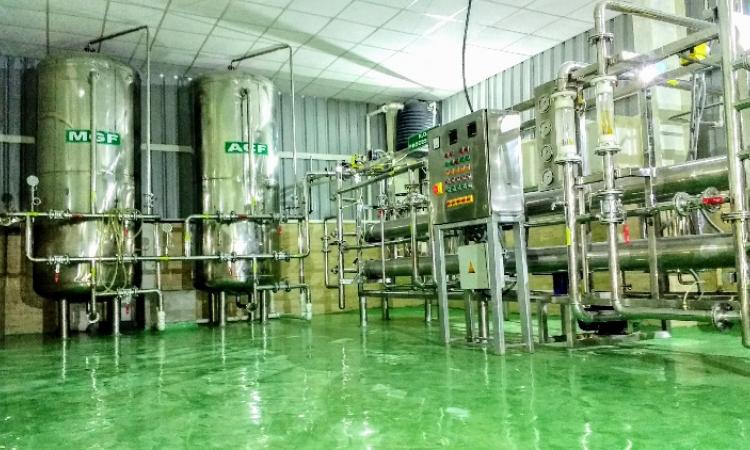
Novel Corona virus is constantly changing its symptoms, speed and scale with an alarming regularity and posing a stiff challenge to scientists, governments and frontline warriors as it assumes pandemic proportions around the globe.
Under such challenging and volatile conditions,business communities are in dire straits due to this sudden, prolonged and unplanned disruption in operations. Packaged drinking water, governed under IS 14543 Protocol and Natural mineral water governed under IS 13428 Protocol of Bureau of Indian Standards are now facing stringent and peculiar conditions, ones which they have never been faced with before since the inception of these projects!
After a complete lockdown announcement with subsequent extensions to it, the bottling units are gearing up to bring the units back on track, as these months are considered as peak business season for them. Packaged drinking water units still got permissions in a few pockets/areas as an essential commodity but for natural mineral units, it has only been tougher and the situation is likely to go from bad to worse, as their target customers, like airports, hotels, malls, clubs, gyms and airlines are unlikely to fully open soon even as the lockdown is lifted. There are multiple challenges which these units are likely to face.
Under normal circumstances, water filtration plants undergo regular operations, maintenance and CIP that keep the plant in good health. However, sudden disruption in operations may have resulted in-
- Turbid/impure water in collection tanks
- Micro-biological and organic impurities in activated carbon
- Fouling of membrane surface
- Bio-growth/films in pipelines, treated storage tanks and filling lines
Critical steps need to be taken to revive the routine operations and a few of them are listed below:
- Intensive cleaning and repeated CIP are critical to revive the routine operations of the plant.
- Intensive backwash/chemical enhanced cleaning of sand filter
- Steaming of activated carbon where facilities exist
- Cleaning/CIP of membranes to remove organic impurities/ bio fouling
- Checking suction mechanism of dozing pumps and checking its NRV.
- Calibration of flow meters
- Testing instruments in laboratory
- Oiling/greasing of mechanical parts of filling lines [ wherein facilities exist]
- Checking the potency of all chemicals being used in the plant along with the expiry date
After such revival steps are carried out and the plant is made operational, it is critical to undertake all requisite in-house tests to establish the capacity and quality of the plant.
Civil Infrastructure
Apart from plant and machinery, the civil infra and cleanliness of the premises assumes critical importance, especially in hot and humid Indian conditions. Furthermore, the dusty particles in closed units settle down on the surfaces and it is an uphill task to cleanse the premises. The major points of emphasis are:
- Mould free atmosphere
- Pest control to free the area from rodents/mosquitoes and other insects
- Cleaning of ventilators/exhaust fans
- Water disposal mechanism
- Sanitization and proper water supply in toilets
- Intensive sanitization of preform/Jar/Caps storage area
- Complete sanitization as per Covid [Industries] guidelines.
Manpower- Human and Humanian issues
There is a shortage of manpower in every industry as majority of the workforce have left for their respective home towns/villages or are in the process of leaving. Bottling units are no exception. Moreover, work from home is not an option in this business as physical presence is critical.
Even as bottling companies face an uncertain future, the employees’ mental health and mindset can be imagined very well.
One needs to encompass the following to retain and support manpower:
- Be in constant touch with your manpower and provide them physical and emotional support.
- Apprising them about “where do we stand” and the current situation. Furthermore, sharing the steps you will be taking to revive the situation. This would instil confidence in them.
- Apprising them of financial constraints and ways to tide over the situation.
- As the staff commences working, the unit needs to follow the Covid procedures with respect to conducting physical / medical tests, tracking travel history records and implementing extensive and regular sanitization programs.
As most of the units face a truncated staff, they need to understand and adopt the critical consignment delivery mechanism. One needs to prioritize the delivery in terms of cream and old customers, good pay master customers and undertake a thorough audit of customers/companies, which will be new or in the category of "sales realization risk" customers. As logistics is undergoing stringent strain due to restrictions, the priority factor assumes critical importance.
Keeping up with regulations
Under the new scenario, government releases new regulations frequently which affect manpower, GST, returns and one needs to keep up with all these updates. The stringent BIS norms concerning daily/weekly reports, independent lab reports, inspections and per annum fees allocation always keep the bottler on his toes and there is no initiative to ease such norms. This needs to be followed diligently.
The units are facing a number of issues and it is difficult to know where to prioritize. As per the general norms, the high to low priority is —employees, customers and suppliers. With an aim to survive first, units should take slow and firm steps to stabilize under such conditions.
Mr Tushar Trivedi is associated with bottled water industry since year 1995 and imparts information on the industry to entrepreneurs, research scholars, associations and portals. Currently , he is associated with Surya Corporation Pondicherry and has been consolidated his works under his portal www.bottledwaterindia.org. He can be approached at tushar.bottledwater@gmail.com, Phone- +91-9810808301
Disclaimer: The views and opinions expressed in this article are those of the author/s and do not necessarily reflect the policy or position of India Water Portal.
/articles/packaged-drinking-water-units-woes-covid-19-perspective